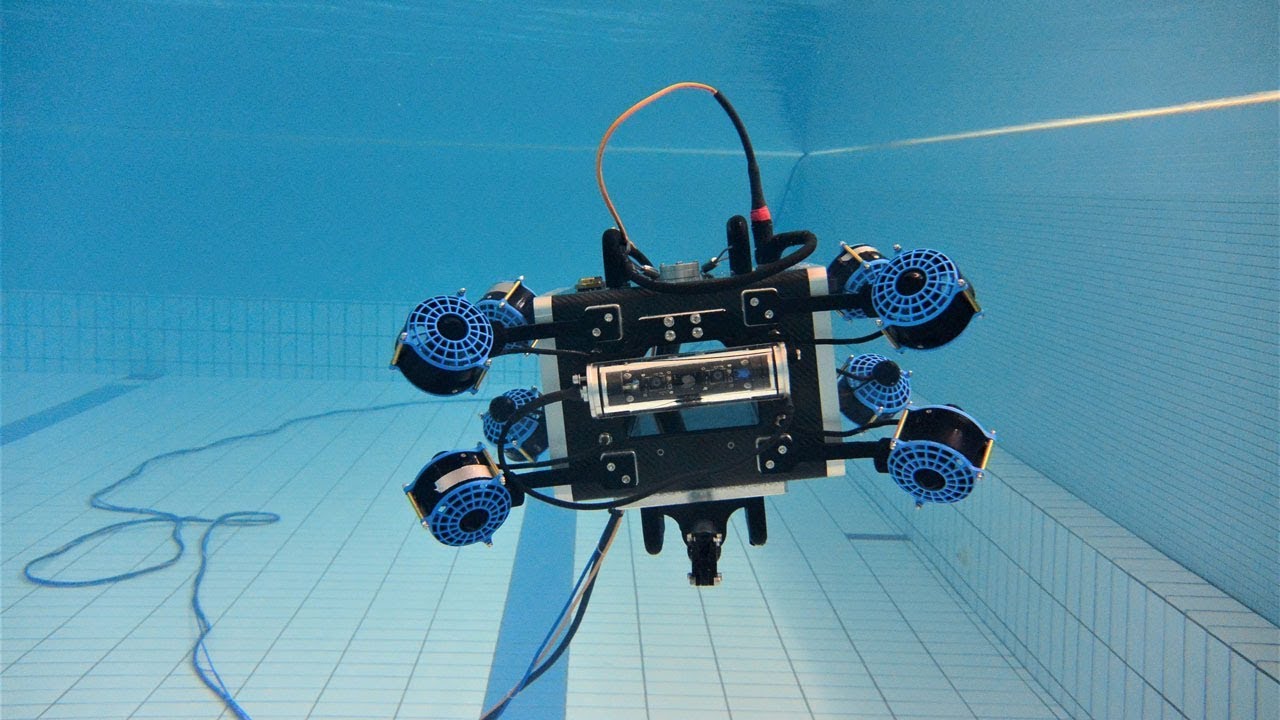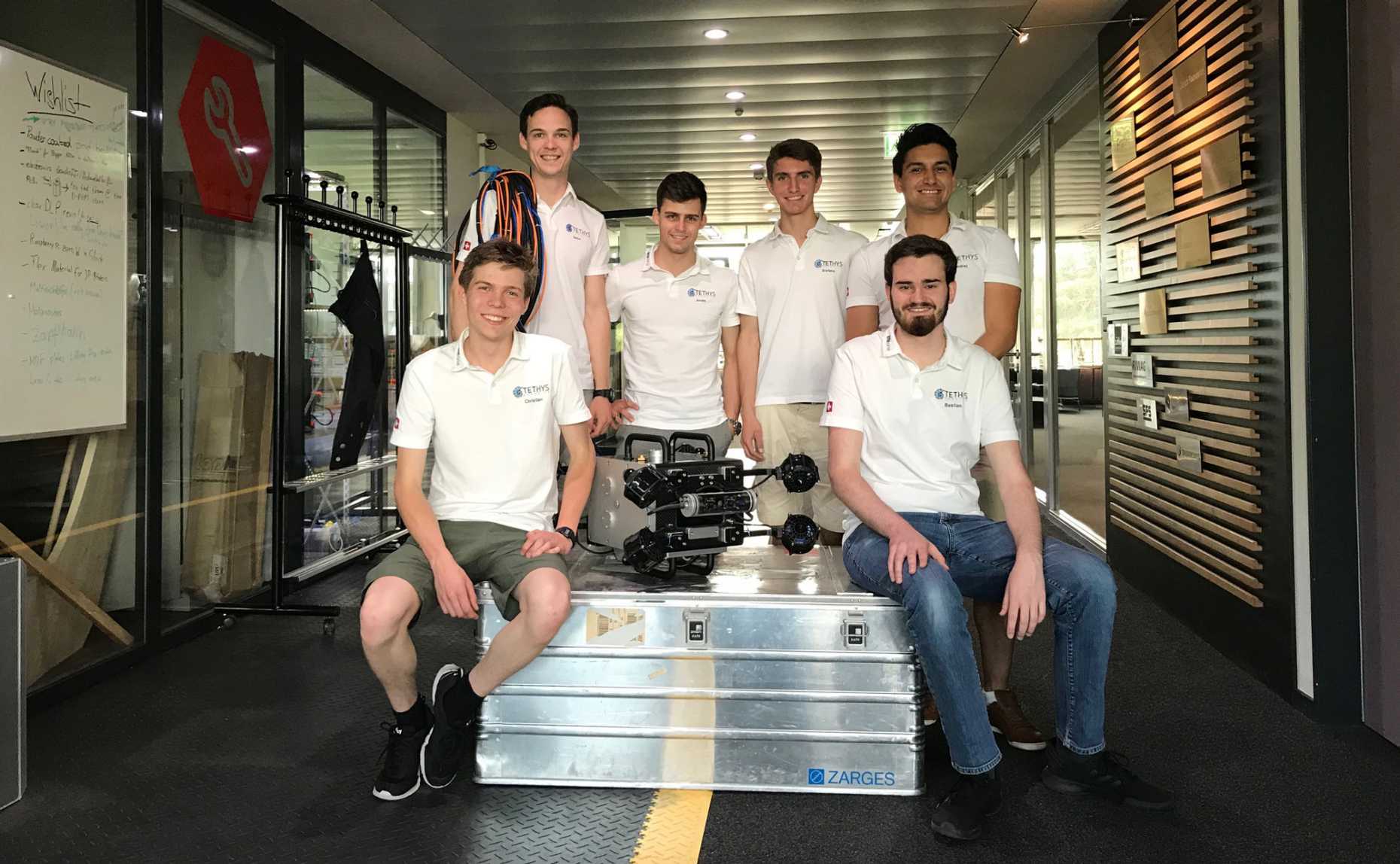Eight students take the plunge
An ETH student became fascinated by diving robots while writing his Matura paper. Three years on, with a group of like-minded enthusiasts, he is taking part in one of the largest competitions for underwater robots – the first team ever from Switzerland.
Dubbed Scubo 2.0, the robot basically consists of software, hardware and a great deal of electronics. “It is all held together by cable ties and duct tape,” Christian Engler says with a twinkle in his eye. The 22-year-old worked with seven other ETH students to build the diving robot, which they are entering in this week’s MATE international ROV Competition in Kingsport, Tennessee, as the first Swiss team to take part. MATE stands for Marine Advanced Technology Education. The competition is regarded as one of the biggest in the field of underwater robotics, bringing together teams of students from all over the world. “It even featured in a film,” says Jonas Wüst with a grin. But this team of computer scientists, mechanical and electrical engineers in the final year of their Bachelor’s degrees haven’t had a chance to see the film yet, as for the past twelve months they have been working non-stop in the Student Project House on their Scubo 2.0 robot.
The fact that they had to submit a video for the competition gave their project a framework by forcing them to set their goals at an early stage. They set up the Tethys Robotics association and developed Scubo 2.0, an eight-armed robot with propellers at the ends to provide propulsion and ensure stability in the water. A long cable powers the device and connects it to the pilots’ two controllers for steering. The cable is essential as wireless signals do not reach beyond a depth of just a few metres in water.
While building Scubo 2.0, the team had access to the materials and expertise of Master’s students who had constructed a diving robot in a previous Focus project. Moreover, Engler is no newcomer to the field of underwater robotics: having built a diving robot for his Matura, he is now fine-tuning his project with his colleagues at Tethys.

Night manoeuvres in the swimming pool
The competition has a different focus every year and follows a certain narrative. This year’s story highlights the role that ROVs play in freshwater rivers and lakes – the natural habitat of students in Switzerland. The robot must negotiate an underwater obstacle course and demonstrate the ability to grasp objects along the course or jettison things from a container at specific points. Controlling the device from the poolside, the two pilots monitor its progress using VR headsets via cameras mounted on the robot.
One of the greatest challenges was waterproofing the robot. “Some days we were in the pool until three in the morning when the housing would suddenly start leaking. It was exhausting,” Wüst recalls. Still, not even these setbacks could dampen their enthusiasm. Another hurdle was the strict competition requirements, such as a limited power supply. But the team rose to the challenge.
However, winning is not the most important aspect for the ETH students. “The competition marks the culmination of an exciting project, and we can’t wait to exchange notes with the other teams,” Engler says. Furthermore, they want to draw on this experience as a stepping stone for their future careers. “We’ve learned a great deal about our own particular strengths,” Wüst says, adding: “It really gives you the edge in interviews if you have a project of this calibre under your belt, where interdisciplinary cooperation is key.” Each of the team members benefited from the expertise of the others.
The fascinating underwater world
For Engler, there is another crucial factor: “I’ve been fascinated by the underwater world ever since my first dive at the age of eleven,” he says, “and there’s so much down there still to discover.” After his Master’s degree, he wants to serve on a Nordic research vessel. “The ones with the big diving robots,” he grins. He is already doing the groundwork by learning Norwegian.
It seems his enthusiasm for the deep seas is infectious. “To begin with, most of us were focusing on the project. But now several are keen to do a diving course,” Wüst says. The first stop, however, is the United States. The leaks have been mended and Scubo 2.0 is already on the move, securely packed in a large metal crate. These eight young men are ready to take on the world.

